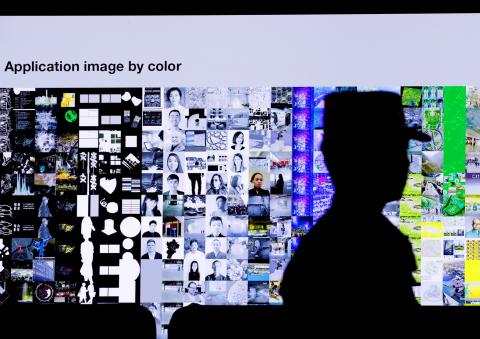An art exhibition exploring the impact of facial recognition technology has opened in China, offering a rare public space for reflection on increasingly pervasive surveillance by tech companies and the government.
Hosted jointly by the southern mainland city of Shenzhen and its neighbor Hong Kong, the Bi-City Biennale of Urbanism and Architecture features more than 60 installations from Chinese and foreign artists exploring the loss of urban anonymity brought about by technological change.
The “Eyes of the City” exhibition is being held at Shenzhen’s Futian station, the first mainland stop on a high-speed rail link that opened last year amid apprehension in Hong Kong about its deepening integration with mainland China.

Photo: Reuters
“Stations have traditionally been a place of anonymity, but they’re becoming places where actually everything is known,” said the show’s chief curator, Massachusetts Institute of Technology professor Carlo Ratti.
“This is one of the things we want to discuss,” he said.
The exhibition comes at a sensitive time in China.
Protests against China’s influence have rocked the former British colony of Hong Kong for months and the rapid spread of facial recognition technology has triggered debate about privacy.
The New York Times last month reported that a Beijing arts center canceled Chinese-American artist Hung Liu’s (劉虹) show of antiwar paintings for no clear reason, though she believed it was related to Hong Kong.
Asked if he was surprised the exhibition had been allowed to open given the unrest in Hong Kong, Ratti said he “found an openness for discussion” in Shenzhen.
“There’s probably not a better place to discuss these issues ... this is a global issue and the best way to deal with it is to open up these technologies and put them in the hands of the public,” he said.
Reuters was unable to contact the event’s organizers and foreign media were not invited to an opening news conference amid concern they would ask about Hong Kong, people with knowledge of the matter said.
The exhibition features a facial recognition system that visitors can opt out of, to draw attention to the inability to opt out in public, Ratti said.
Other works include facial monitors that track visitors’ emotional engagement with the exhibits and digitalized images of fishing boats in one of Shenzhen’s older harbors using advanced Lidar technology by artists Ai Deng and Li Lipeng.

Tens of thousands of Filipino Catholics yesterday twirled white cloths and chanted “Viva, viva,” as a centuries-old statue of Jesus Christ was paraded through the streets of Manila in the nation’s biggest annual religious event. The day-long procession began before dawn, with barefoot volunteers pulling the heavy carriage through narrow streets where the devout waited in hopes of touching the icon, believed to hold miraculous powers. Thousands of police were deployed to manage crowds that officials believe could number in the millions by the time the statue reaches its home in central Manila’s Quiapo church around midnight. More than 800 people had sought

DENIAL: Pyongyang said a South Korean drone filmed unspecified areas in a North Korean border town, but Seoul said it did not operate drones on the dates it cited North Korea’s military accused South Korea of flying drones across the border between the nations this week, yesterday warning that the South would face consequences for its “unpardonable hysteria.” Seoul quickly denied the accusation, but the development is likely to further dim prospects for its efforts to restore ties with Pyongyang. North Korean forces used special electronic warfare assets on Sunday to bring down a South Korean drone flying over North Korea’s border town. The drone was equipped with two cameras that filmed unspecified areas, the General Staff of the North Korean People’s Army said in a statement. South Korea infiltrated another drone

COMMUNIST ALIGNMENT: To Lam wants to combine party chief and state presidency roles, with the decision resting on the election of 200 new party delegates next week Communist Party of Vietnam General Secretary To Lam is seeking to combine his party role with the state presidency, officials said, in a move that would align Vietnam’s political structure more closely to China’s, where President Xi Jinping (習近平) heads the party and state. Next week about 1,600 delegates are to gather in Hanoi to commence a week-long communist party congress, held every five years to select new leaders and set policy goals for the single-party state. Lam, 68, bade for both top positions at a party meeting last month, seeking initial party approval ahead of the congress, three people briefed by

Cambodia’s government on Wednesday said that it had arrested and extradited to China a tycoon who has been accused of running a huge online scam operation. The Cambodian Ministry of the Interior said that Prince Holding Group chairman Chen Zhi (陳志) and two other Chinese citizens were arrested and extradited on Tuesday at the request of Chinese authorities. Chen formerly had dual nationality, but his Cambodian citizenship was revoked last month, the ministry said. US prosecutors in October last year brought conspiracy charges against Chen, alleging that he had been the mastermind behind a multinational cyberfraud network, used his other businesses to launder